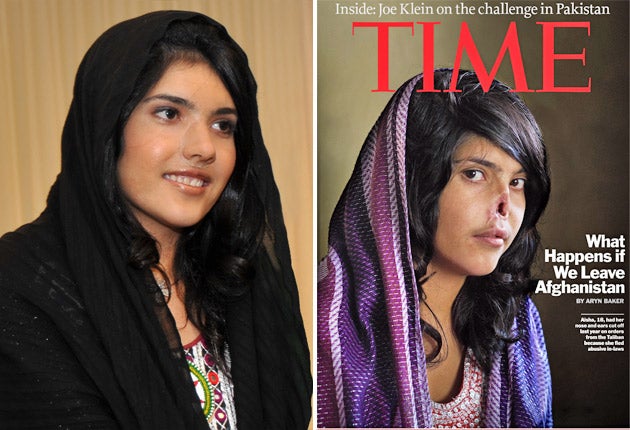Justice for the symbol of Afghan cruelty
Former father-in-law 'confesses' to mutilation that shocked the world

Your support helps us to tell the story
From reproductive rights to climate change to Big Tech, The Independent is on the ground when the story is developing. Whether it's investigating the financials of Elon Musk's pro-Trump PAC or producing our latest documentary, 'The A Word', which shines a light on the American women fighting for reproductive rights, we know how important it is to parse out the facts from the messaging.
At such a critical moment in US history, we need reporters on the ground. Your donation allows us to keep sending journalists to speak to both sides of the story.
The Independent is trusted by Americans across the entire political spectrum. And unlike many other quality news outlets, we choose not to lock Americans out of our reporting and analysis with paywalls. We believe quality journalism should be available to everyone, paid for by those who can afford it.
Your support makes all the difference.She became a cause célèbre after her husband sliced off her nose and ears. Seventeen-year-old Aisha dared to escape a brutal forced marriage – so a Taliban judge decided to make an example of her, ordering her in-laws to carve her up one night in a remote mountain clearing last year.
Then in August, Aisha fell into the international spotlight when Time magazine ran her photograph on its cover. In an instant the horrifying wound in her face came to embody the dangers posed to women by any peace deal with Afghanistan's insurgents.
Now human rights officials in Afghanistan are disputing that version of events, absolving the Taliban of any responsibility in the case and pinning the blame squarely on Aisha's husband and his family.
"The girl is a victim of family violence," said Abdul Ghafar Stanikzai, the acting director of the Afghan Independent Human Rights Commission. "Based on our investigations and interviews with people, including her father-in-law, this is not the work of Taliban but the result of family violence."
For their part, the Taliban have always denied having anything to do with the matter. But that account has been thrown into doubt by the confirmation by Afghan officials that Aisha's father-in-law, identified as Mohammed Sulaiman, was arrested last week on charges of disfiguring Aisha and being involved in a local Taliban network.
Mr Sulaiman was said to have confessed to the attack – although he then told the BBC that he was innocent. Shortly afterwards the authorities began refusing requests for interviews. The young woman's family have demanded he suffer the same fate as she did.
Whether or not Mr Stanikzai's account turns out to be correct, it's an unpalatable reminder that far from being the preserve of the Taliban, domestic violence is a national phenomenon in Afghanistan, as the original Time article noted. Forced marriages, child brides, imprisonment of women, honour killings and domestic violence are all common.
There is the practise of baad, or giving away girls to settle disputes. Some schoolgirls have had acid thrown in their faces and others set themselves on fire as a cry for help. Child marriage is so pervasive in northern Afghanistan that a popular saying holds: "If you hit a girl with your hat and she doesn't fall over, it's time to marry her."
Rather than being a product of Taliban rule, the repression of women springs from the same ugly mishmash of honour codes, cultural norms and Islamic fundamentalism that gave rise to the movement in the first place.
The Independent understands that a UN report on violence against women, released today, finds the Afghan government is too weak to enforce laws that are supposed to protect women. Many law enforcement officials refuse to apply the law anyway, or only pursue cases where they can use legislation to prosecute women seen to have broken cultural taboos. Runaway brides, for example, are often imprisoned on a charge of zina, or sex outside marriage. Afghanistan's prisons are full of women who have chosen incarceration for "moral" crimes over life at home.
Campaigners argue that any peace deal with the Taliban will entrench the difficulties facing Afghan women. "This is sadly something that happens all over the country and while the prospect of a possible return of the Taliban to the political mainstream certainly means the climate for tackling the violence against women will become more hostile, this is a national phenomenon, not limited to one ethnic or religious group," said Rachel Reid, an Afghanistan analyst.
"It feels more like a cultural phenomenon than anything else and it's a general shift in attitude about women's role in society that's needed," she added.
Join our commenting forum
Join thought-provoking conversations, follow other Independent readers and see their replies
Comments